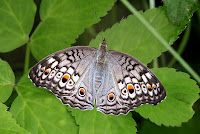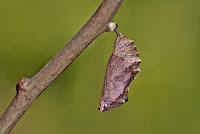<> Junonia atlites (Linnaeus,1763) <>
the Grey Pansy ผีเสื้อแพนซีเทา
Click on any photo to see all photos full size in Lightbox
Additions and corrections to the information provided on this page is always welcome. Please use the Contact form.
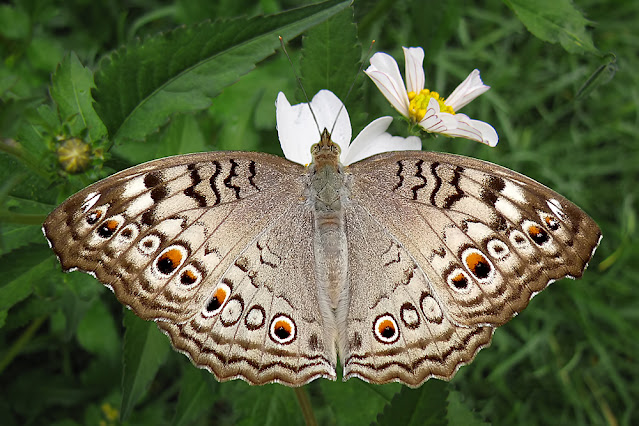
Photo taken at Lamnamkok National Park, Chiang Rai, Thailand. 450m a.s.l.

Junonia atlites is quite common and found throughout the SE Asia region. It is often seen near streams and rivers but usually as individuals, rarely in numbers. There is very little visual difference between the sexes but the female is slightly larger and a little darker. It is an active and alert butterfly and is very easily disturbed. It likes sunshine and is usually seen at forest edges and in sunny glades within the forest. It basks on low foliage with wings widespread but when it lands on the ground it tends to keep them closed. It can be difficult to approach and is quite timid. Like other members of the Junonia genus it has a slow, rather lazy flight.
The species is multivoltine with several broods per annum. The adult female lays her eggs singly on the leaves or shoots of the host plant. When the young larva emerges it eats the eggshell as its first meal. The larva is initially yellowish in colour with a black head capsule but darkens as it progresses through the instars. The full life cycle takes around a month to complete.
Synonyms and previously used names: Papilio atlites, Papilio laomedia, Precis atlites, Precis laomedia, Junonia laomedia
Taxonomy: Animalia - Arthropoda - Insecta - Lepidoptera - Nymphalidae - Nymphalinae - Junonia - atlites
Regional subspecies: Junonia atlites acera (Indonesia), Junonia atlites atlites (most locations)
Regional Distribution: India, Nepal, Bhutan, Bangladesh, Myanmar, Thailand, Laos, Cambodia, Vietnam, China, Taiwan, Malaysia, Singapore, Indonesia, Philippines
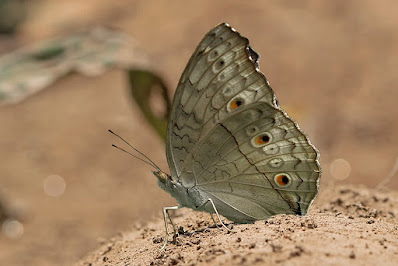 |
| Doi Suthep-Pui National Park, Chiang Mai, Thailand 450m a.s.l. |
Habitat: Junonia atlites is found in open and secondary forest, hillsides, grassland, and urban parks and gardens. It is often found near streams. It has been recorded at all elevations up to ~1000m a.s.l.
Flight time: all year, depending on location Wingspan: 50-65mm
Life History: egg 5 days instar 1 2-3 days instar 2 2-3 days instar 3 2-3 days instar 4 2-3 days instar 5 3-4 days pupa 8-10 days Total egg to adult 29-33 days
All times are approximate and can vary depending on the season and on the host used.
Larval Hosts: Barleria cristata, Barleria prionitis, Blechum pyramidatum, Hygrophila auriculata, Hygrophila erecta, Hygrophila ringens, Nelsonia canescens, Ruellia blechum, Ruellia tuberosa, Strobilanthes schomburgkii (Acanthaceae), Bonnaya antipoda, Lindernia procumbens, Torenia crustacea (Linderniaceae), Alternanthera philoxeroides, Alternanthera sessilis (Amarathaceae), Oryza sativa (Poaceae), Phyla nodiflora (Verbenaceae), Pluchea indica (Asteraceae), Limnophila indica, Limnophila repens, Limnophila villosa (Plantaginaceae). Hosts used depends upon location and availability of plant species.
Adult Food Sources: Nectar - Varronia cylindristachya (Boraginaceae), Ziziphus mauritiana (Rhamnaceae), Celosia argentea, Gomphrena globosa (Amaranthaceae), Austroeupatorium inulifolium, Bidens pilosa, Chromolaena odorata, Cosmos bipinnatus, Cosmos sulphureus, Emilia sonchifolia, Mikania micrantha, Tagetes erecta, Tridax procumbens (Asteraceae), Lantana camara, Stachytarpheta indica, Stachytarpheta jamaicensis (Verbenaceae), Urena lobata (Malvaceae), Mimosa diplotricha (Mimosaceae), Stephanotis volubilis (Apocynaceae), Terminalia arjuna (Combretaceae), Bergera koenigii (Rutaceae), Pseuderanthemum reticulatum (Acanthaceae), Platostoma axillaris, Vitex negundo (Lamiaceae). Other - mud puddling (occasional), animal dung
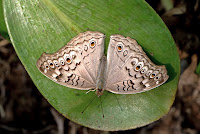 |
| Urban area, Siem Reap, Cambodia |
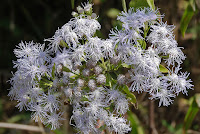 |
| Chromolaena odorata, a nectar source |
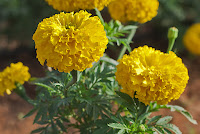 |
| Tagetes erecta, another nectar source |
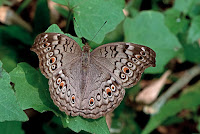 |
| Lamnamkok National Park, Chiang Rai, Thailand |
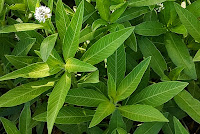 |
| Alternanthera philoxeroides, a larval host |
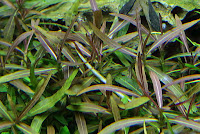 |
| Hygrophila ringens, another larval host |
Links to other pages in this series for species in the same subfamily
Junonia atlites
Junonia orithya
Symbrenthia hypselis Yoma sabina

